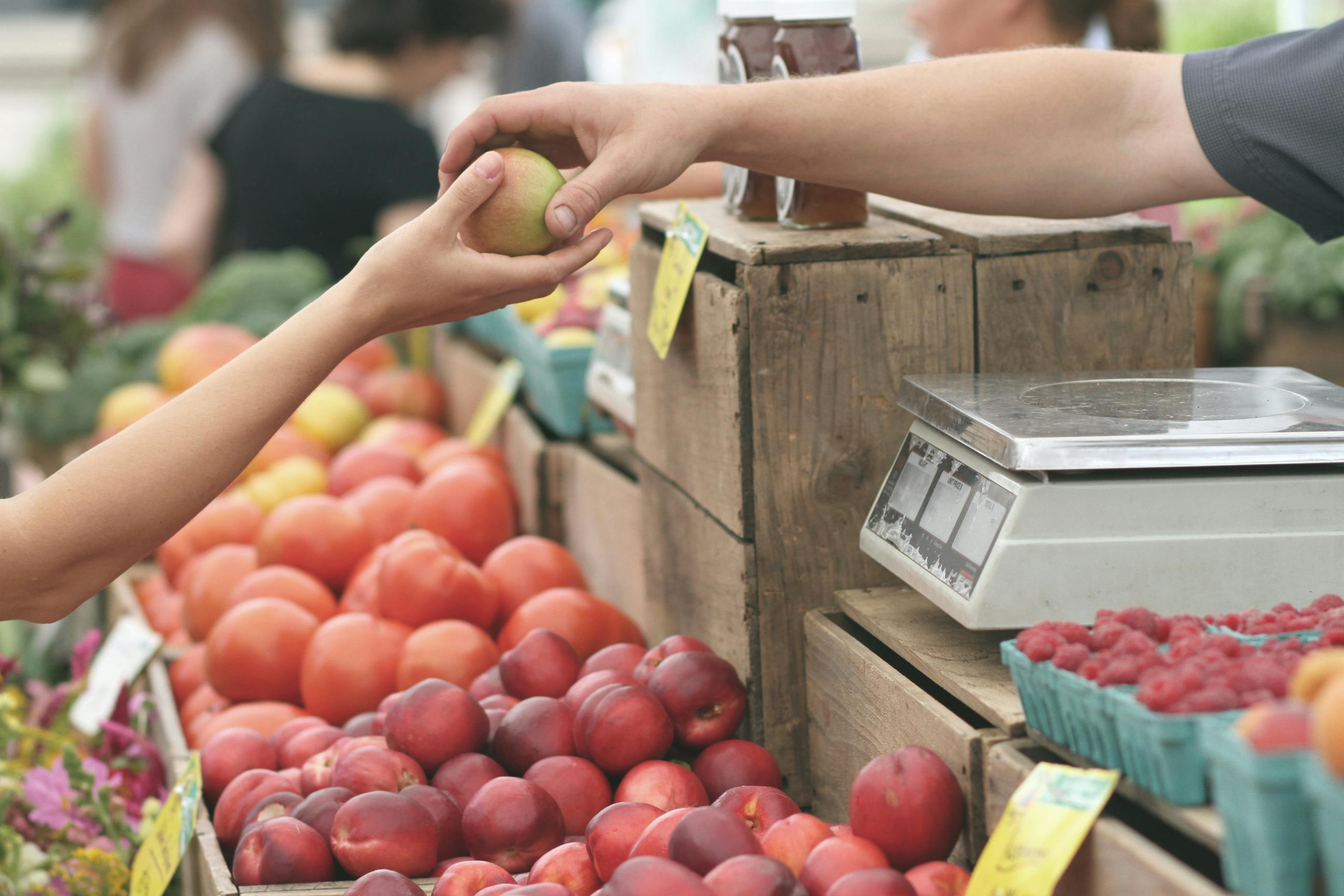
At the market: numbers and prices
CEFR: A1
Read/Listen first
Good morning. I look at the fruit stand. A small sign says “two euros each.” Another sign says “six euros a kilo.” I ask, “How many apples do you want?” My friend says, “Three apples, please.” I count the apples, say the price, and take the bag. I check the total and give the coins back. The price is clear. It is easy to pay.⚡ Learning goals
- I can ask for a price.
- I can count items at a stand.
- I can say the total cost.
✨ Key language
- How much is it? “Ask the price of apples.”
- Two euros each, please. “State a simple unit price.”
- Here is your change. “Give coins back after payment.”
⚙️ Rules & Grammar — 4 Structures
1️⃣ a/an + noun (singular)
Rule: Use a or an before one item.Examples: a kilo of apples; an orange for me; a price tag on fruit
Common pitfall + fix: Use ‘an’ before vowel sounds — Say ‘an orange’, not ‘a orange’.
Choose the correct article: ___ apple
Tip: Use ‘an’ before vowel sound.
Fill with the best answer: I want ___ kilo of apples.
Tip: One unit → use ‘a’.
2️⃣ There is / There are
Rule: Use there is for one, there are for many.Examples: There is a sign.; There are two prices.; There are six coins.
Common pitfall + fix: Do not mix singular/plural — Say ‘There are two apples.’.
Choose: There __ two prices.
Tip: Plural noun → are.
Fill with the best answer: There __ a sign on the stand.
Tip: One sign → is.
3️⃣ Numbers + noun
Rule: Put the number before the noun.Examples: three apples please; two euros each; six euros a kilo
Common pitfall + fix: Do not add plural to numbers like ‘one’ — Say ‘one apple’, not ‘one apples’.
Choose the best: ___ apples, please.
Tip: Numbers do not take plural endings.
Fill with the best answer: I want ___ orange, please.
Tip: Use ‘one’ for a single item.
4️⃣ Can for polite request
Rule: Use can to ask politely.Examples: Can I pay now?; Can you count, please?; Can I have a bag?
Common pitfall + fix: Do not use complex modals at A1 — Use ‘can’ only for simple requests.
Choose the polite request.
Tip: Use ‘Can I…’ for polite requests.
Fill with the best answer: ___ you count the apples, please?
Tip: Begin the question with ‘Can’.
✍️ Vocabulary
price
Meaning: cost of an itemSynonyms: cost, fee, amount
Chunk/Idiom: the price is two euros
Example: The price is two euros
Morphology: noun
Self-practice: Say the price out loud.
kilo
Meaning: one thousand gramsSynonyms: kilogram, kg
Chunk/Idiom: six euros a kilo.
Example: Six euros a kilo.
Morphology: noun
Self-practice: Read the weight on the sign.
change
Meaning: money you get backSynonyms: coins, return
Chunk/Idiom: here is your change.
Example: Here is your change.
Morphology: noun
Self-practice: Count the coins.
bag
Meaning: small paper or plastic carrySynonyms: sack, tote
Chunk/Idiom: a bag for the apples.
Example: A bag for the apples.
Morphology: noun
Self-practice: Ask for a bag.
sign
Meaning: small card with wordsSynonyms: label, notice
Chunk/Idiom: a sign shows the price.
Example: A sign shows the price.
Morphology: noun
Self-practice: Point to the sign.
each
Meaning: price for one itemSynonyms: per, single
Chunk/Idiom: two euros each.
Example: Two euros each.
Morphology: adv.
Self-practice: Check price per item.
☁️ Examples (+ audio)
The sign says two euros each.
There are three apples in the bag.
Can I pay now, please?
Here is your change. Thank you.
✏️ Exercises
Grammar
Choose the best sentence.
Tip: Numbers + plural noun.
Select the correct form.
Tip: Plural noun → are.
Fill with the best answer:
I want ___ bag, please.Tip: One item → a/an.
Fill with the best answer:
___ you count the coins, please?Tip: Use ‘Can’ for a request.
Vocabulary & Comprehension
Which word means money you get back?
Tip: ‘Change’ = coins back.
Choose the word for 1000 grams.
Tip: One kilo = 1000g.
Fill with the best answer:
The ___ shows the cost.Tip: Look at the price tag.
Fill with the best answer:
It is two euros ___ .Tip: Price for one item.
✅ Guided practice
Mini-dialogue:
A: How much is the apple?B: Two euros each.
A: Can I have a bag, please? — B: Yes.
Why this matters:
Prices are clear. You can check numbers. You can ask the total.Verb & Adjective Pack:
count — *Count the three apples.*pay — *Pay the correct price.*
check — *Check the total again.*
Try & compare:
Fill with the best answer: I pay ___ euros for one apple.
Tip: Read the number on the sign.
Self-correction: Fix the sentence: She have three apples.
Tip: Use ‘has’ with she/he/it.
Practice aloud: Listen, repeat, then type the sentence.
Here is your change.
Tip: Say it clearly and slowly.